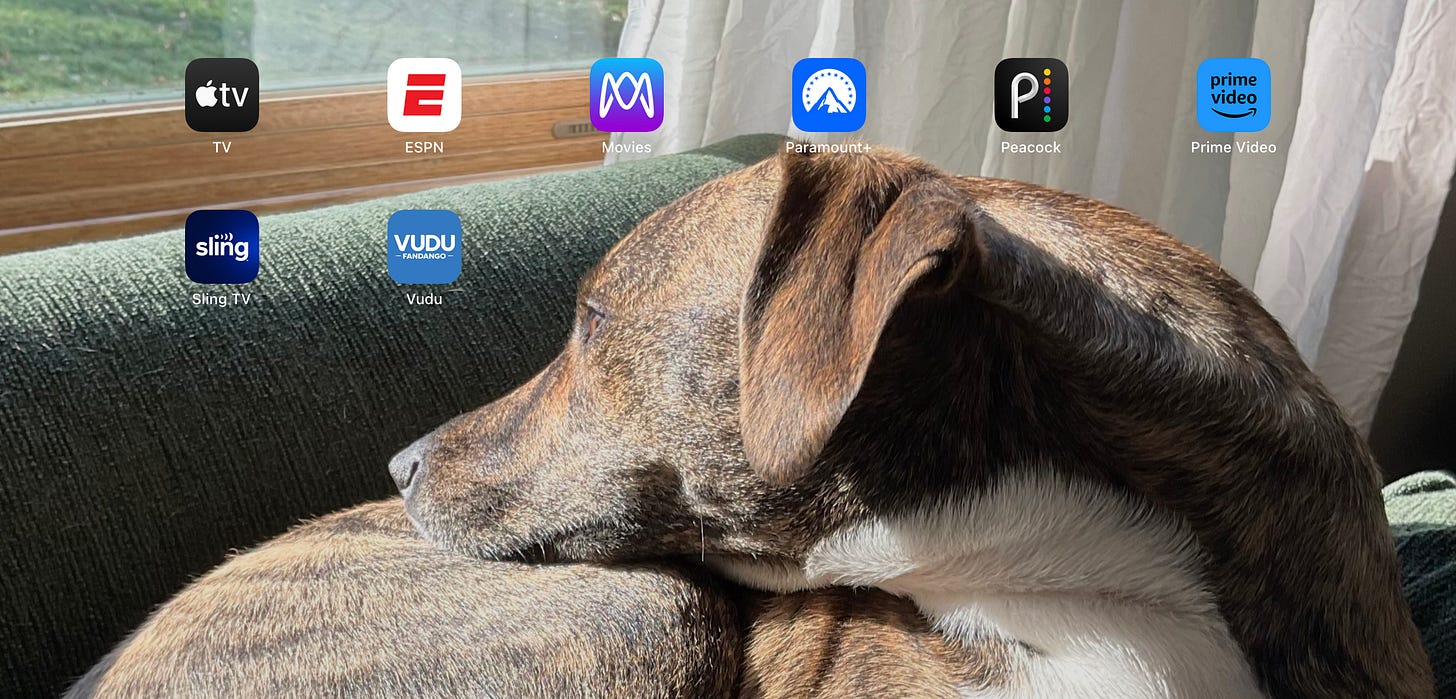House of the Streamers
A simple guide to stop uncritically giving money to streaming services that you barely ever use

There was a backlash against Netflix when they announced that they would be implementing procedures against subscribers from sharing their Netflix accounts with people outside of their households; a situation that I believe was already technically not permitted under the terms of use of Netflix’s service but was widespread and even tongue-in-cheekily endorsed by Netflix on occasion. However, they seem to have finally put the new rules into place in the United States, as my mom found out when she mistakenly selected hers as the “household” for a Netflix account that actually belongs to my sister in a different state. I expect with this rollout that the rage against Netflix will only grow as people cancel their subscriptions in protest, at least for a month or two.
For my part, I am not currently a subscriber to Netflix, but it’s not because they’re blocking me from sharing my account with other people. Netflix wanting to stop people from essentially stealing their content in a market that’s now saturated with competing streamers and where they’ve begun losing money makes perfect sense to me. I don’t personally have a problem with them doing that and, if it’s successful in increasing Netflix’s revenue, I expect all of the other streamers will soon follow suit.
Instead of swearing off streamers who would dare expect you to pay for their content, there’s a better way. You can be more proactive in your relationship to these major corporations—it doesn’t have to be all or nothing.
Now, as I said, I don’t have a subscription to Netflix currently; according to an email I received from them on June 4 it had been 196 days since I last subscribed. The reason for that is two-fold: One, I find Netflix to be too expensive for the most part, though upon review their plans and pricing have improved since the last time I checked, and two, they simply haven’t put out any content that I feel the need to pay to watch in the now 200+ days since I last subscribed.
When there’s something that I want to watch on a streaming service, most recently it was Ted Lasso on Apple TV+, I will subscribe to that service to watch what I want to watch and then I will cancel the subscription before it can renew again. In the case of Netflix they put out entire seasons, or at least half-seasons, of their shows all at once, which means that I can pay for a month’s subscription, binge the show, and cancel the subscription before it ever renews. That’s one single payment to Netflix and for that month I can watch whatever it is that I wanted to watch and I can watch other content that I might have been interested in but not enough to pay for a subscription at the time. For a show like the aforementioned Ted Lasso on Apple TV+, they adhere to a more traditional cable-like structure of releasing one episode per week, in which case I will let a backlog of the season build up before I subscribe so that I can binge the backlog and then finish the season with a single payment for a subscription. So, for, I believe, $6.99 I was able to binge the entire latest season of Ted Lasso, and I was able to watch the first season of Shrinking, an unexpected gem which I highly recommend, and the movie Ghosted which is a fun Summer action movie.
There’s simply no reason to pay to let a subscription to these streaming services auto-renew month after month on the off-chance that you might be bored one night. You can save yourself a lot of money by being more strategic in when you pay for a subscription. Furthermore, I would advise that when you do decide to pay for a subscription that you immediately cancel that subscription right after signing up so that you don’t forget to cancel it before it renews.
As a completely pointless aside, but for the sake of transparency, I do maintain a regular subscription to Peacock, because it has so many of my favorite shows that I tend to just rewatch over and over like The Office. Peacock also happens to be one of the cheaper subscriptions in the streaming market, so it doesn’t hurt my wallet as much. If and when I find that I’m no longer using that subscription regularly I’ll cancel it.
Maybe this advice is common sense to most people, but I am the only person that I know in real life who does this. Most other people maintain never-ending subscriptions to more than one streaming service that they largely ignore most of the time. So I’m writing this on the off-chance that someone who hasn’t really given it much thought might realize that they haven’t watched Netflix in over two months but that they’ve spent $20-$40 maintaining that subscription for no reason and decide to do something different going forward. And you also don’t have to start a vendetta against Netflix for them not allowing you to steal their content on your friend’s account either; you can simply partake of what they offer occasionally instead of letting them take advantage of you.


